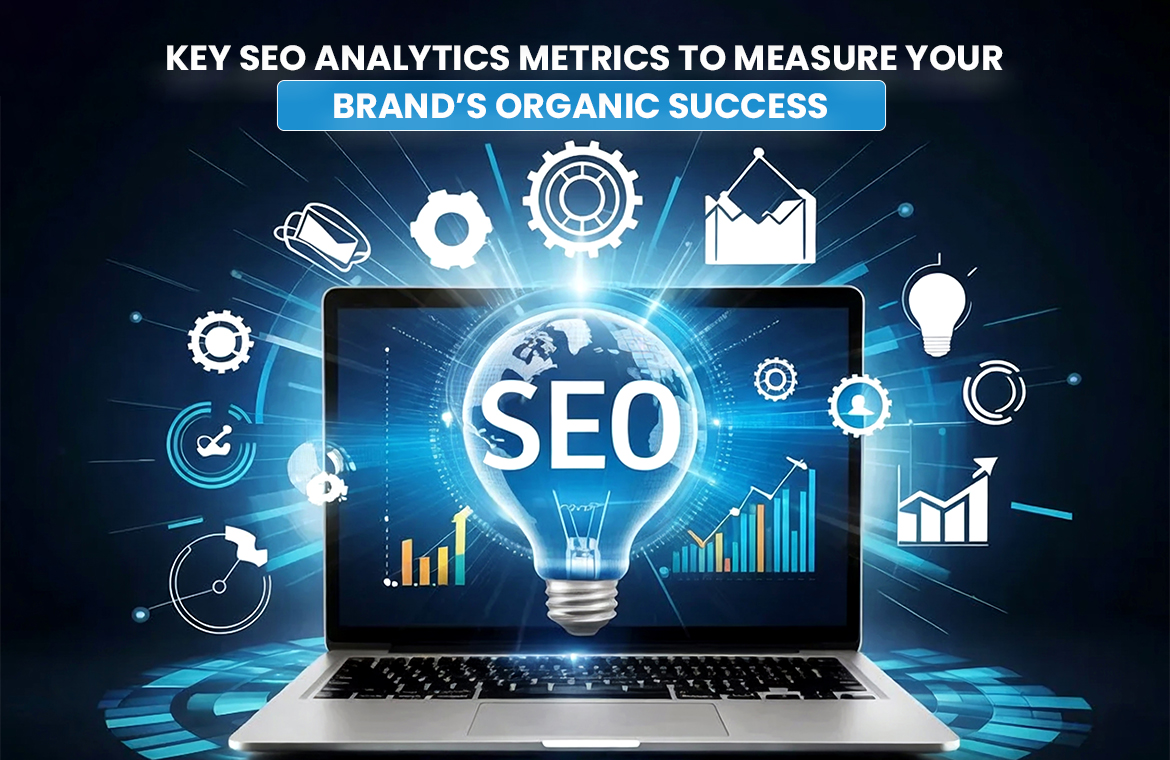How to measure your brand’s organic success?
Search engine optimization (SEO) is immensely useful for bringing organic traffic to your website, leading to growth opportunities for your brand. Tracking the right analytics metrics can help you understand what works, what needs fixing, and how the organic performance of your brand changes over time.
These things aren’t going to happen overnight: more organic sessions, conversions, and revenue. One needs to monitor your technical, visibility, and search engine metrics to find their ineluctable performance metrics.

Tracking your leads and sales
Whether you’re using Hubspot or Salesforce, we track the lead funnel and closely observe the impact of organic traffic.
Given that conversions are trackable in Google Analytics but only pertain to MQLs, the issue lies that only SQL conversions can increase revenue, market share, and growth.
Not all organic traffic aligns with your key objectives.
For e-commerce marketers, the revenue is obtainable through GA. But we don’t want just any organic traffic.
Key SEO metrics
While our primary focus is revenue, market share, and growth, there remain several traditional metrics for SEO success that we need to observe and optimize. If we were to accomplish these, we would be on the path of achieving your business objectives.
To summarize, the success of SEO can be evaluated as follows:
– organic traffic
– keyword positions
– backlinks
– bounce rate
– time on page
– pages per session
These indicators will help you understand what aspects of the SEO strategy you may need to improve and help evaluate your SEO performance overall.
Organic traffic
Understanding how SEO impacts organic users and sessions makes measuring success easier. For some clients, we are looking for more new users to convert. For others, the key objective is organic traffic that encourages a repeat visit.
In the end, we want to see ‘quality’ organic traffic as this sort of traffic that fosters growth.
Keyword tracking
Keyword rankings are heaven, they do make an impact: One research with more than 4 million search results noted that one takes 27.6% of total clicks in position 1 and functions greater than positions 1 and 2 combined, click-wise does far better than even positions 3 to 10. It helps all brands be visible on searches, driving more clicks in the long run and building credibility and reputation.
But rankings alone don’t define them. Next to ranking, we’d also like to consider search visibility via competitive analysis for SEO measures, rich snippets, and more.
Monitoring backlinks
You have probably read that they were always going to die during the years. But backlinks are still important. Possibly now than ever, voice search and artificial intelligence drive search to deliver results.
We do not measure SEO success by the total number of backlinks. We want to see quality links coming from contextual domains and URLs. If they are not from locally relevant or industry-related links, they do not count. Ideally, we want to see backlinks that genuinely, and actively drive traffic to your website: That is how we measure a backlink’s success.

Bounce rate, time spent on the page, and pages viewed during a session
Bounce Rate, Average Session Duration, and Pages/Session are all different metrics, but along with flip-through rate on an Ahrefs Content Audit and Average Time on Page in Google Analytics, they all give you an idea of what the quality of traffic your clients are getting from SEO.
We still require the right traffic. Because if people leave within 10 seconds of clicking on your link, that won’t help you grow organically.
Comprehending the co-working of SEO with different channels
You are already aware of your audience buyer journey enough. Does your reporting adhere to all the necessary stages of this journey? Like the majority, are you relying on last-click attribution?
Last-click attribution is much cleaner. To present SEO success, using organic traffic produced in the final converting session does dress up nicely. But let us not be deceived-it does not tell the whole story.
Let us now consider another scenario in which the content strategy has worked perfectly. In this case, the user first got onto the site through an organic email subscription and email newsletter conversion.
Understanding first-click and last-click attribution enables you to establish the role that organic and SEO play. At the same time, you will also want to know if other channels are involved in collecting these organic conversions and give you the complete picture of what fuels growth. We want to find out whether social media drives the first visit, while ultimately a branded search drives the conversion to complete it.
Lifetime customer value prophecies the doom of another loss
When it comes to understanding ROI on organic search, paid search, and even social, way too often we look at only the direct conversion. The customer who attributes to organic and SEO becomes a repeat visitor for the next three years. How do you attribute revenue that far out?
Do you know the lifetime customer value (LCV)
Have you segmented your audience to be able to determine what the average LCV is for organic-generated conversions versus other channels? Ideally, that would be the real way to gauge your success in SEO.
Don’t overlook any of the many other success factors
SEO isn’t something you can measure up to a simple one-trick. It adds business value across a variety of outcomes. With the agenda of measurement standing here, it is partially an uphill struggle to understand SEO successes without totally undermining other benefits that emanate from SEO.
These include:
-Gains in trust and credibility
-Insight into the user and changes in behavior (consumer and market insights)
-Increased conversion rates and UX
-Brand reach, awareness, and glory (PR)
Trust and Credibility Increased
Anyone with a knowledge of consumer psychology understands that constant positioning at a very prominent ranking builds credibility. However, not appearing on the first search results page can hinder the reputation of your website in the mind of the searcher.
Personal user insight and behavior change (consumer and market insights)
Having your SEO handled by a dedicated professional provides you with thorough information that grounds your business decisions. It is very likely to prop up before your product launches and help you with your seasonal search volumes. Other geographical keyword analysis can help you in keeping your excellent due diligence of making new location openings. An SEO competitor analysis can help you find out how competitors drive organic traffic, give your business early insight into their strategies, and allow you to adapt and thus compete fairly with them.
Higher conversion rates and better user experience.
Hire a professional SEO agency or a professional with great experience, and your page experience (UX) and conversion rates will improve. UX is a ranking factor, and as such, improved performance will lead to a natural increase in conversion rates. Good SEOs are as obsessed with conversion rates as others: we want to see results reflecting well on our work.
Brand reach, awareness, and reputation management accordingly for SEO
Improving your search visibility will help SEOs reach you and create awareness; it will enhance your brand/business reputation, driving your business model, and your SEO. More than this, a responsible SEO agency will drive you to work on your reputation management for SEO.
Forecasting SEO’s possible success.
SEO is never a one-glance, easily-implemented success. Depending on your competitive landscape, the industry you are operating in, the age of your company, and your current optimization, the timeframe within which we can produce solid and impressive results will vary substantially.
But basically, adopting the SEO attitude must be something long-term. This is what SEO forecasting is This forms the basis of our planning, and we use the forecast to define KPIs for you to monitor all this and have you eventually see growth.
The forecasting enables us to act with milestones we need to achieve within certain timescales to meet our goals. These milestones also allow us to measure success accordingly.
The full scope of what success means to SEO
In a sense, measuring SEO success in terms of revenue, market share, and growth becomes almost self-serving. In the preparation of budgets, it is essential for SEO to demonstrate its value to the organization. Thus, we too are equally concerned about growth and revenue as you are. At the same time, however, we understand that a lot of what constitutes an SEO success cannot be quantified and even if they are outside the scope of a report, they play a big role in informing and guiding our strategies.
Search engine optimization is very far from dead. With AI rhetoric coming through in search, ever-increasing guidance and help in this area is paramount, with skillful decision makers always topping high on the list of value. So, put together a capable team that you can trust.
When it comes to enterprise to a large audience, Search Engine Watch hit the nail right on the head ‘SEO is, without doubt, the most cost-effective channel in the world today.’
Conclusion
To build a sustainable online presence, measuring your brand’s organic success with SEO analytic metrics is key. By measuring the different SEO KPIs for organic growth organic traffic, keyword rankings, CTR, bounce rates, etc. You can fine-tune your strategies, resolve issues, and catch opportunities to foster brand growth.
For SEO to be successful, it must be developed continuously. Trends and periodic analyses of the metrics and adjustments based on what the data say will keep you on your toes above your competitors and make it possible for your brand to experience continuous growth.
Stay committed to monitoring these essential SEO metrics for brand performance. Soon, you’ll realize that you’re on the right track to achieving your goals in organic growth
FAQs
Q1. What is the most important SEO metric for organic growth?
This metric can vary in importance according to your specific goals: organic traffic is usually a leading indicator of SEO success, referring to the extent it shows how many users found their way to your website through search engines.
Q2. What steps can be taken to enhance the Bounce Rate further?
Enhancing your website’s bounce rates could be achieved by improving content, optimizing for mobile devices, increasing loading speeds, and ensuring ease of use in navigation.
Q3. What are some SEO analytics tracking tools?
When it comes to SEO metrics tracking there are some external solutions, including Google Analytics, Google Search Console, SEMrush, Ahrefs, and Moz.
Q4. What role does Domain Authority play in SEO?
Domain Authority is an index showing the likelihood of the search engine positioning of any given web resource. A higher value raises your site’s visibility, increasing its search ranking.
Q5. How often should I review my SEO metrics?
One should consider monitoring monthly, to know how well your site is faring and tweak your strategy if need be.
Also Read: How White-Hat Backlinks Supercharge Your SEO Marketing Strategy
